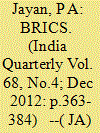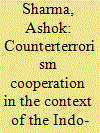|
|
|
Sort Order |
|
|
|
Items / Page
|
|
|
|
|
|
|
| Srl | Item |
| 1 |
ID:
117617


|
|
|
|
|
| Publication |
2012.
|
| Summary/Abstract |
In the era of regional international relations and more interdependence, organisations like the Brazil, Russia, India, China and South Africa (BRICS) can play a meaningful role in international level as well as regional in years to come. The recent summit of the BRICS reiterates that more cooperation is needed at various levels. In Delhi declaration, it is called for a more representative international financial architecture, with an increase in the voice and representation of developing countries and the establishment and improvement of a just international monetary system that can serve the interests of all countries and support the development of emerging and developing economies. Moreover, these economies having experienced broad-based growth are now significant contributors to global recovery. This is true. One must acknowledge the fact that the roles of the BRICS countries are composed of various political systems, various subcontinent, but in the changed context, all these countries are coming under the purview of the 'developing countries' in broader terms. That makes the BRICS beyond the regional boundaries to set a benchmark in the regional cooperation. China's permanent status in the United Nations makes the BRICS more strategically oriented and pragmatic aspects of foreign policy engagement in the twenty-first century. The political leadership and vision is equally important with economic engagement. The four major theories of the international relations (IR) are striking in this respect which includes liberalism, realism, constructivism and Marxism. Theoretical framework relevant to regionalism in focusing on IR theories is also analysed in this article. The main argument of the article is that there is no prescribed regional model and BRICS has to tune to the member countries' regional and political frameworks to engage with. Therefore, the framework of analysis is more or less critical about the Western engagement and it is region focused.
|
|
|
|
|
|
|
|
|
|
|
|
|
|
|
|
| 2 |
ID:
117614


|
|
|
|
|
| Publication |
2012.
|
| Summary/Abstract |
In the post-9/11 world, the current US counterterrorism efforts in the Af-Pak region and the terror attacks on Indian cities have prompted India and the US to cooperate more closely on counterterrorism concerns. However, this counterterrorism cooperation is not commensurate with the comprehensive Indo-US strategic partnership. This apparent lack of cooperation plays out in their approach toward terrorism and bureaucratic impasse. India and the US need to make use of the trust and confidence that they have built in their bilateral relationship, readjust their perspectives on the threat of terrorism, understand each other's core national security interests that shape their respective anti-terrorism goals, and make counterterrorism an important module in their 'strategic partnership' to tackle terrorism at the domestic, regional and global levels.
|
|
|
|
|
|
|
|
|
|
|
|
|
|
|
|
| 3 |
ID:
117616


|
|
|
|
|
| Publication |
2012.
|
| Summary/Abstract |
Pakistan's obsession of searching for a 'strategic depth' across the Durand Line in Afghanistan and a 'Muslim Space' in the Indian state of Jammu and Kashmir has proved to be a devastating policy for the country in pursuit of which its military-intelligence establishment implanted the seeds of Islamism, extremism and state-sponsored terrorism on both sides of their borders. This strategic overstretch, though driven by a strong military sense of geo-politics among its largely military rulers, is embedded in the country's unrealistic yearnings, out of place perceptions and false grievances. The army outsourced its ill-conceived strategy to jihadi organisations and religious institutions and allowed local militias, terrorist groups, guerrilla armies and other non-state actors to emerge in different parts of the country who afterwards claim political and religious authority. Rawalpindi (army headquarters) supported these terrorists as a cheap way to keep India and Afghanistan off balance. But over the years, they have metamorphosed into a menace and the more powerful terrorist groups-which are also the more radical ones-have outgrown their handlers; fatally weakening the political institutions, declining the role of the state and creating monsters that threaten to devour Pakistani society. In the process, the failure of the state apparatus is creating a culture of impunity and ultimately leading to the breakdown of the rule of law in the country. Clearly, ongoing fragility appears to be a prelude to a failed state. Thus, the extremists' growth and power in Pakistani society are a direct result of its policy towards India and Afghanistan. What is required is a four-dimensional approach to promote liberal democracy, to reduce the role of military, to reform madrassah, and to emphasise on economic development through cross-border trade with India and Afghanistan. The Pakistani strategic obsession has large-scale security implications both for its neighbours and the international community at large, and hence, requires closer scrutiny and analysis.
|
|
|
|
|
|
|
|
|
|
|
|
|
|
|
|
| 4 |
ID:
117615


|
|
|
|
|
| Publication |
2012.
|
| Summary/Abstract |
This article seeks to fill a major gap in existing studies on how Asians perceive the European Union. It discusses the Union's efforts to promote its visibility in India since the mid-1990s and provides an overview of the Indian literati's perceptions of contemporary Europe. This article examines the perception, representation and visibility of the EU in the Indian media, among business, civil society and media 'elite' and in public opinion. It explores whether the Union's self-proclaimed representation as a global actor, a normative power and a leader in environmental negotiations conforms to how it is actually perceived in Third World countries. It evaluates whether more than a decade of summitry has led to greater visibility of the EU in the Indian media. The article concludes by making a comparison of EU imagery in media, elite and public opinion discourses, and makes several recommendations on how EU can possibly improve its visibility in future.
|
|
|
|
|
|
|
|
|
|
|
|
|
|
|
|
| 5 |
ID:
117618


|
|
|
|
|
| Publication |
2012.
|
| Summary/Abstract |
The dispute over the sovereignty of the Southern Kuriles as known to the Russians and Northern Territories as termed by the Japanese has been the main hurdle in the full blown development of relations between the two countries. The settlement of the territorial dispute is linked to the signing of the peace treaty between the two. The geo-strategic/political developments in the Asia Pacific region in the recent years have impacted the negotiations on the disputed territories. The Russian President Medvedev's visit to the Kunashiri Island on 1 November 2010 and the following military build-up by Russia on these territories have changed the security scenario of North-east Asia. The Russian stance on the issue has hardened which is attributed to its resurgence and assertiveness in Asia and elsewhere consequent to the flush of revenue from oil and natural gas exports. Russians do not seem to be in a mood to even negotiate on the two small islands of Shikotan and Habomai, while the Japanese position has been changing over the years and now they are insisting on the return of all the four islands. However, the trade and investment relations between the two are steadily growing as the Japanese need Russian oil and natural gas and the Russians are keen for Japanese investment and technology. The Russians in the meantime have developed strong economic ties with China and South Korea which indirectly has a bearing on the state of relations between Russia and Japan. A compromise between the two can be of immense benefit to both the countries. The development of the relations to its full potential would be possible only after the resolution of the territorial dispute.
|
|
|
|
|
|
|
|
|
|
|
|
|
|
|
|
|
|
|
|
|